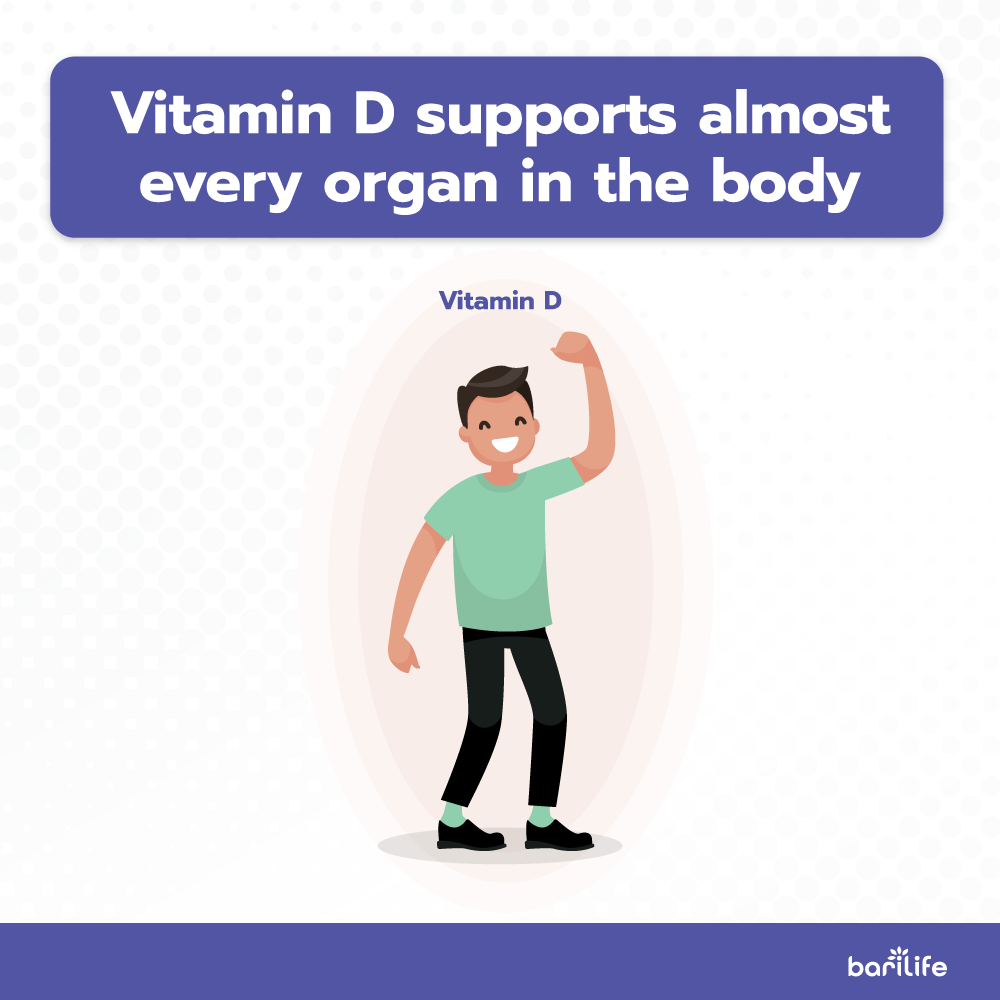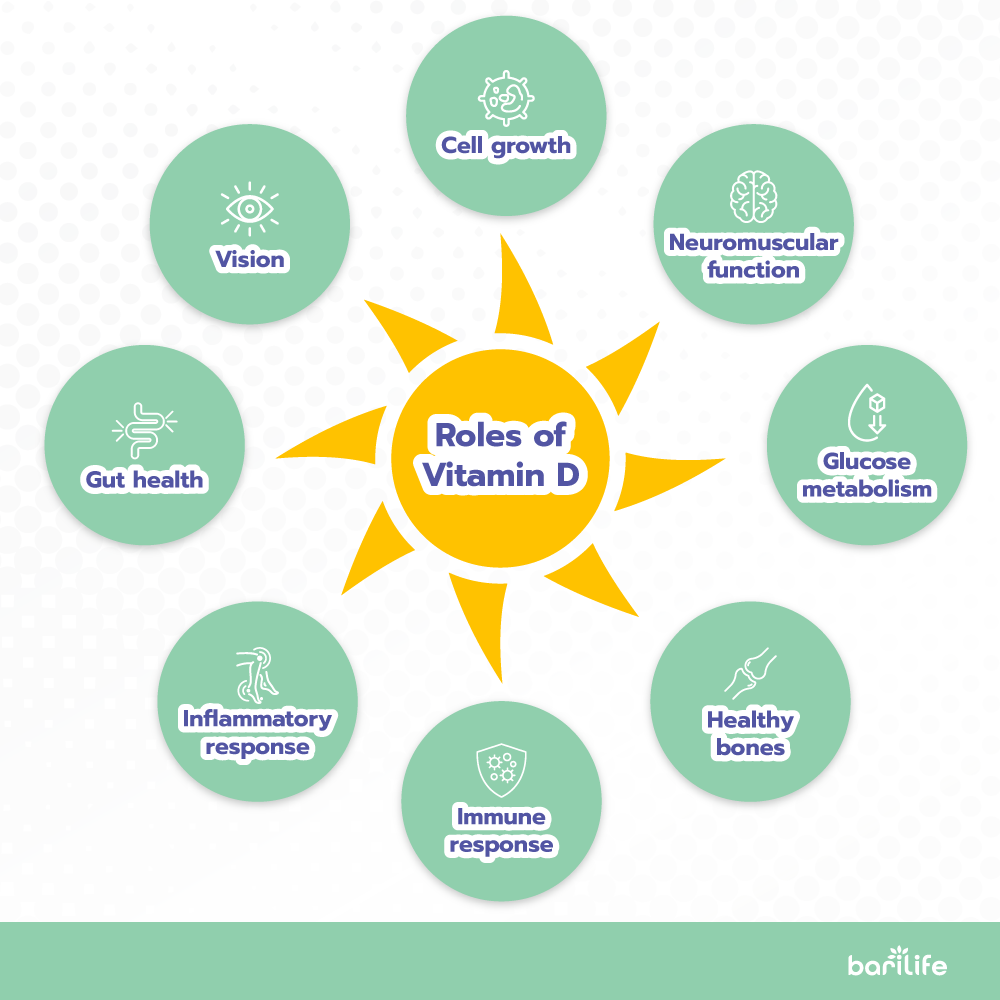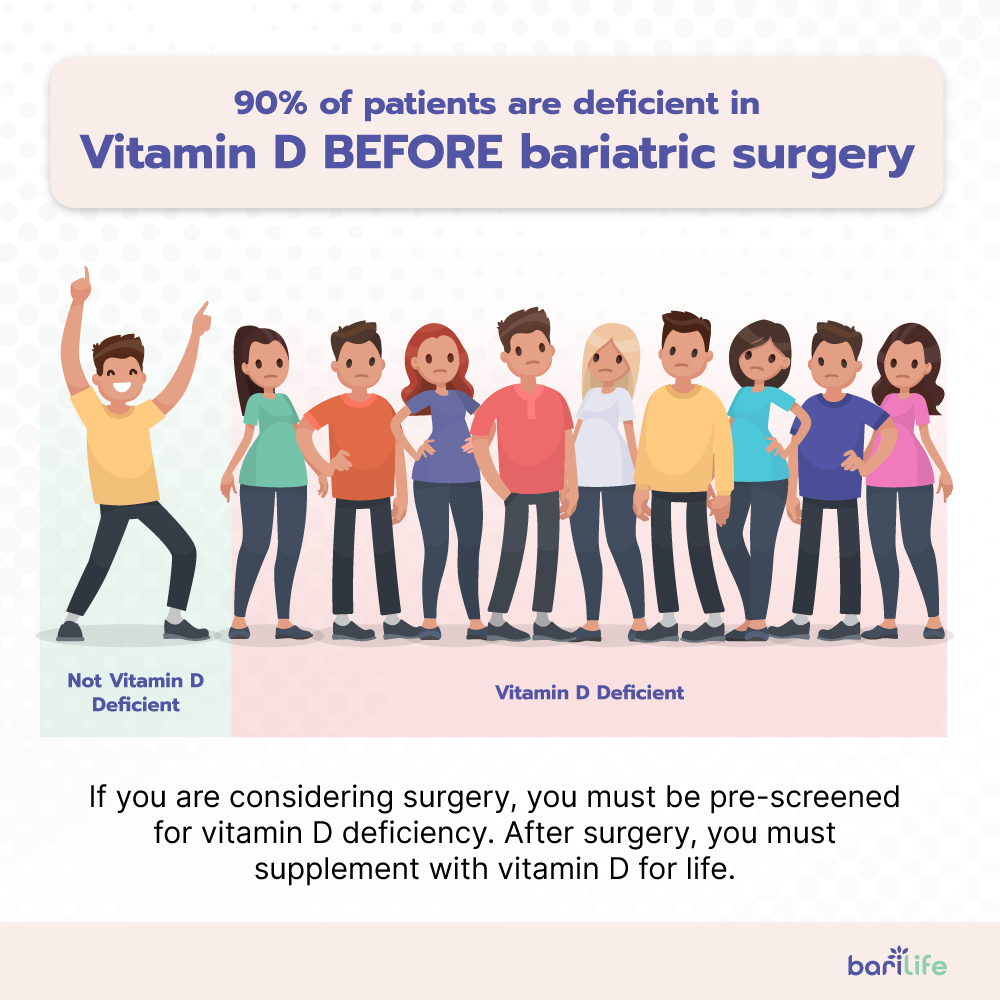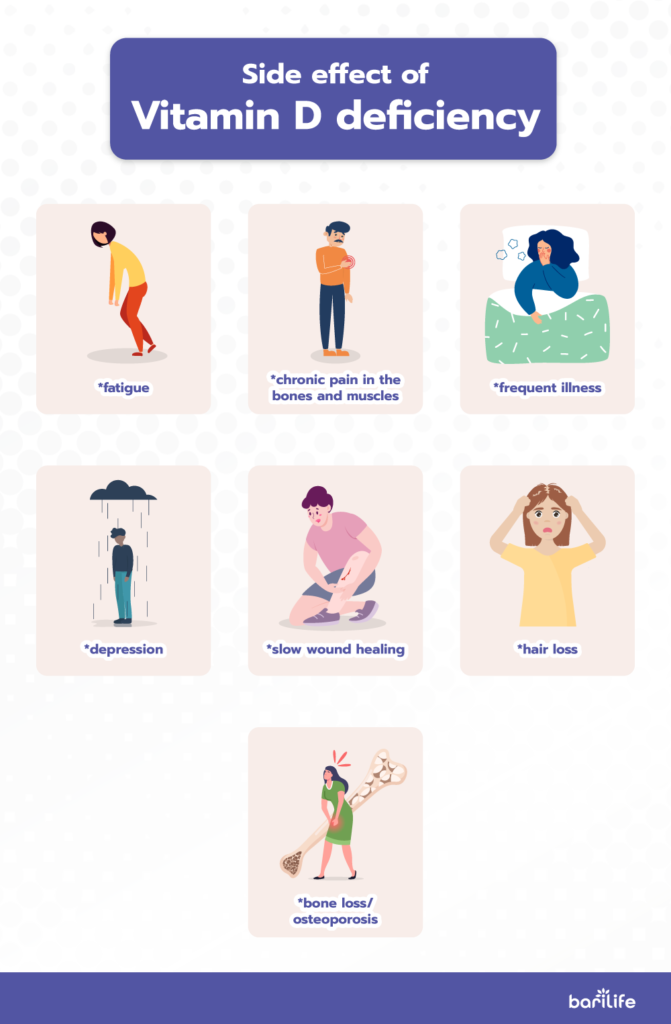As you may know, daily vitamins and minerals are a necessary part of care and maintenance after having gastric bypass surgery. The body’s digestive processes have been altered, and your body becomes less capable of absorbing necessary nutrients.
To maintain proper nutrition and functioning after you’ve had bariatric surgery, you will need to take a multivitamin every day for the rest of your life. Vitamin D is one of the essential vitamins you need to supplement.
Vitamin D (aka calciferol) is a fat-soluble vitamin found in some foods and is available as a dietary supplement. It can also be made in the body from UV rays when the sun hits the skin and activates vitamin D synthesis.

The role of Vitamin D in the body
Vitamin D is necessary to support many functions in almost all organs. Unlike other vitamins, it functions as a hormone in the body. Every cell in the body has a Vitamin D receptor.
Vitamin D improves the absorption of calcium in the gut and maintains appropriate calcium and phosphorus levels in the blood.
During the developmental years, vitamin D helps build strong bones and teeth and prevents rickets, a bone disease seen in children.
Throughout other stages of the lifespan, it supports and maintains healthy bones by regulating the amount of calcium and phosphorus in the body. When taken with calcium, vitamin D can prevent osteomalacia (bone softening) in adults and osteoporosis in aging adults.
Along with promoting bone health, Vitamin D also plays a role in the immune and inflammatory responses. Multiple studies have shown that patients with lower Vitamin D levels are more at risk for adverse outcomes of infections.
Additionally, studies show that many patients with chronic inflammatory diseases (e.g. cardiovascular disease, diabetes, chronic kidney disease, and others) have lower levels of Vitamin D. Research suggests that Vitamin D supplementation can result in better outcomes for patients with chronic inflammatory diseases.
Vitamin D also plays a role in other processes in the body including cell growth, neuromuscular functioning, and glucose metabolism.
You can see that Vitamin D is an essential nutrient that has many roles in the body, and adequate intake is vital for good health and proper functioning.

The ASMBS guidelines for Vitamin D
The American Society for Metabolic and Bariatric Surgery (ASMBS) issues guidelines related to the pre-and post-operative screening for malnutrition of specific vitamins and minerals. They also provide guidelines for the minimum intake required to prevent nutrient deficiencies.
According to the ASMBS, Vitamin D deficiency is prevalent among approximately 90% of individuals who are obese. Due to this statistic, it is recommended that patients be screened for Vitamin D deficiency prior to weight loss surgery. It is especially important for pre-and post-menopausal women.
It is recommended for all patients to be routinely screened for Vitamin D and calcium deficiency after receiving weight loss surgery.

To prevent deficiency, patients should take supplemental Vitamin D and calcium every day for life. Specific recommendations for supplement dosing varies by procedure. Your doctor will prescribe you the right amount based on your procedure and serum levels.
The recommended dose for calcium supplementation is 1200 – 2400 mg per day. Vitamin D supplementation should be based on serum Vitamin D levels (blood levels). Patients should take 75 mcg daily until serum Vitamin D reaches 30 mg/ml.
Signs, symptoms, and complications that can arise from becoming deficient
There are several risk factors associated with Vitamin D deficiency. These include darker skin, advanced age, being overweight or obese, infrequent sun exposure, kidney or liver disease, diet low in foods that have Vitamin D, health conditions that affect nutrient absorption (Crohn’s or celiac disease), and having gastric bypass surgery.
Many people who are deficient in Vitamin D are unaware that they are lacking this vital nutrient due to the fact that symptoms are generally mild.
Some symptoms of Vitamin D deficiency include:
- Frequent episodes of fatigue – Constant fatigue and feeling tired can have many causes, so often vitamin D deficiency is a potential cause that can be overlooked. Studies show supplementation may improve energy levels.
- Chronic pain in the bones and muscles – Studies suggest that there may be a link between chronic pain and Vitamin D deficiency.
- Frequent illness or getting sick often – Vitamin D plays an essential role in immune support and the inflammatory response. Deficiency can often lead to a weakened immune system, resulting in more frequent illness and infection.
- Depression – About 65% of observational studies show a link between vitamin D deficiency and depression. Some studies show that supplementing Vitamin D can reduce the symptoms of depression, particularly seasonal depression.
- Slow healing wounds or bruises – Vitamin D deficiency may result in poor wound healing following surgery, infection, or injury.
- Hair loss – Some research suggests that low vitamin D levels may be a risk factor for developing alopecia.
- Bone loss – Low-bone mineral density can be a sign of poor vitamin D levels.

Given the possible signs and symptoms of Vitamin D deficiency, it is easy to understand the complications that can occur in patients who receive bariatric surgery. Surgery is an invasive procedure that requires optimal conditions for healing. As noted above, low vitamin D levels can lead to poor wound healing outcomes. This should be a major concern when considering surgery.
Another serious complication that can occur with prolonged Vitamin D deficiency is osteoporosis. Maintaining adequate bone mineral density is necessary for preserving the quality of life in older adults.
Weight loss surgery impairs the body’s ability to properly absorb nutrients, so Vitamin D supplementation is needed to support strong bones, immunity, and other important body processes.
Bari Life vitamins has exactly what you need
There are so many vitamins and mineral supplements on the market, and they are not all created equal. There are a variety of different brands and doses, not to mention products that contain multiple vitamins in one supplement. It can be really difficult to figure out what vitamins to take and how to choose which product is right for your needs.
After bariatric surgery, you need to supplement many different vitamins to keep you healthy. This can also be very overwhelming if you have to take multiple pills at different times of the day.
Bari Life takes the guesswork out of vitamin supplementation and simplifies supporting your nutritional needs. Bari Life Vitamins are formulated and developed by a team of bariatric medical professionals with one goal in mind – to help bariatric patients get the nutrients they need to stay healthy.

They offer a variety of different options, from tablets to powders, helping you get the correct amount of vitamins and minerals in the least amount of pills possible. Bari Life multivitamins contain 75 mcg of vitamin D which is exactly what you need to prevent deficiency.
Staying on track with lifestyle changes like diet, exercise, and supplementation is important to your success after bariatric surgery, so trust in the vitamins from Bari Life to provide you with the vitamins and minerals you need to stay healthy.




What are your tips and tricks to post-bariatric success?